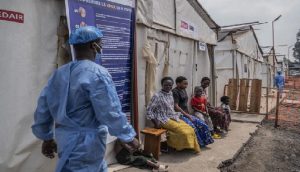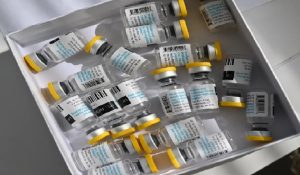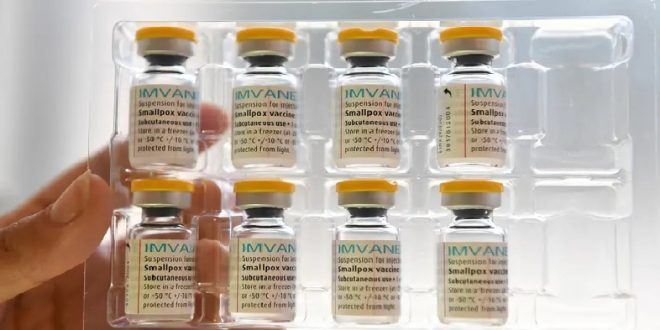27-08-2024
BERLIN/ UNITED NATIONS: Germany will donate 100,000 mpox vaccine doses from its military stocks to help contain the outbreak on the African continent in the short term as well as provide help to the affected countries, said a government spokesperson on Monday.
 The government will provide the World Health Organization with flexible financial resources via various instruments to combat mpox and also support its partners in Africa through the GAVI vaccination alliance, added the spokesperson.
The government will provide the World Health Organization with flexible financial resources via various instruments to combat mpox and also support its partners in Africa through the GAVI vaccination alliance, added the spokesperson.
Germany has around 117,000 doses of Jynneos, which is being stockpiled by the German army after Berlin procured it in 2022.
It will keep a minimum amount of stock, to protect travelling authorities, for example, said a defence ministry spokesperson on Monday. A separate decision would need to be made when it comes to reordering vaccines, he added.
The World Health Organization has declared mpox a global public health emergency after an outbreak in the Democratic Republic of the Congo spread to neighbouring countries and a new form of the virus, clade Ib, triggered concerns about the speed of transmission.
The government was looking at the quickest way to get the vaccines to the affected countries, primarily the Democratic Republic of Congo, but also Burundi and neighboring countries in East Africa, according to a foreign ministry spokesperson.
On 25 July 2024, the Ministry of Health of Burundi declared an outbreak of mpox following the confirmation of three cases by the National Reference Laboratory of the National Institute of Public Health. These cases were identified on 22 July; one case from Kamenge University Hospital, a second case from Kamenge Military Hospital, and the third case from Isare Health District. They reported symptom onset on 24 July including fever, joint pain, and a widespread rash. Samples collected during a multidisciplinary investigation tested positive for mpox on 25 July with PCR. These are the first confirmed mpox cases ever identified in Burundi.
As of 17 August 2024, there had been 545 alerts of mpox cases since the outbreak declaration, of which 474 suspected cases (86.9%) had been investigated and validated. Of 358 suspected cases tested, 142 (39.7%) tested positive for MPXV. Genomic sequencing analysis has confirmed clade Ib MPXV. No deaths were reported as of 17 August.
 Confirmed cases have been reported from 26 of the 49 districts (53.1%). The most affected district is Bujumbura Nord, an urban area, with 54 of the 142 confirmed cases (38%). No deaths had been documented at the time of reporting.
Confirmed cases have been reported from 26 of the 49 districts (53.1%). The most affected district is Bujumbura Nord, an urban area, with 54 of the 142 confirmed cases (38%). No deaths had been documented at the time of reporting.
Males account for 55.6% of the cases and females for 44.4%. Children under the age of five years make up 28.9% of the cases, followed by those aged from 11 to 20 years (20.4%), and those aged from 21 to 30 years (18.3%).
As of 7 August 2024, four confirmed mpox cases and zero deaths had cumulatively been reported by the country. Among the two new cases, one is a 34-year-old male, residing in Gasabo District in Kigali. His symptoms started on 15 July 2024 with fever, swollen lymph nodes, sore throat, and rashes on the arms, face and genitals. He had travelled back from Burundi on 12 July 2024 and is currently in isolation. Five close contacts are under follow up. The other case is a 39-year-old Rwandan male, resident of Kicukiro District with travel history to the Democratic Republic of the Congo.
Investigations revealed that transmission occurred outside Uganda and no secondary transmission has been linked to the two cases as of 12 August 2024. (Int’l Monitoring Desk)
 Pressmediaofindia
Pressmediaofindia




